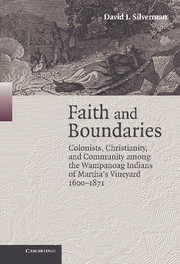 Faith and Boundaries
Faith and Boundaries Published online by Cambridge University Press: 17 December 2010
John Cotton Jr.'s maiden voyage to Martha's Vineyard in 1665 must have been a time of soul searching and low expectations. Two years earlier, this Harvard-educated son of a Puritan divine was run out of the Wethersfield, Connecticut, pastorate for sexual indiscretion and a sharp tongue. To rehabilitate his name, Cotton had to perform good Christian service while behaving himself; so some time later, when the opportunity arose to proselytize the Vineyard Wampanoags, reluctantly he accepted the position. One imagines Cotton sailing toward his destination, eyes fixed on the shrinking mainland shoreline, reflecting on his fall from an elite family, college, and pulpit, to become a poorly compensated missionary on a remote island responsible for filling “poor ignorant savages” with a sense of God.
Cotton spent the next year preparing for his work by studying the notoriously complex Wampanoag tongue, but this was hardly enough training, as he discovered when he finally met with an Indian audience at Chappaquiddick on March 6, 1666. He plodded through his inaugural Native-language sermon, and then perhaps breathed a sigh of relief assuming the hard work was done, only to have the Wampanoags shower him with a volley of questions sharpened by two decades of Christian education: “How conscience came to be asleepe or silent in a man at any time?” “Whether Judas was saved or damned?” And perhaps most surprisingly: “Whether John Baptist onely sprinkled christs face with water or plunged him under water?”
To save this book to your Kindle, first ensure [email protected] is added to your Approved Personal Document E-mail List under your Personal Document Settings on the Manage Your Content and Devices page of your Amazon account. Then enter the ‘name’ part of your Kindle email address below. Find out more about saving to your Kindle.
Note you can select to save to either the @free.kindle.com or @kindle.com variations. ‘@free.kindle.com’ emails are free but can only be saved to your device when it is connected to wi-fi. ‘@kindle.com’ emails can be delivered even when you are not connected to wi-fi, but note that service fees apply.
Find out more about the Kindle Personal Document Service.
To save content items to your account, please confirm that you agree to abide by our usage policies. If this is the first time you use this feature, you will be asked to authorise Cambridge Core to connect with your account. Find out more about saving content to Dropbox.
To save content items to your account, please confirm that you agree to abide by our usage policies. If this is the first time you use this feature, you will be asked to authorise Cambridge Core to connect with your account. Find out more about saving content to Google Drive.